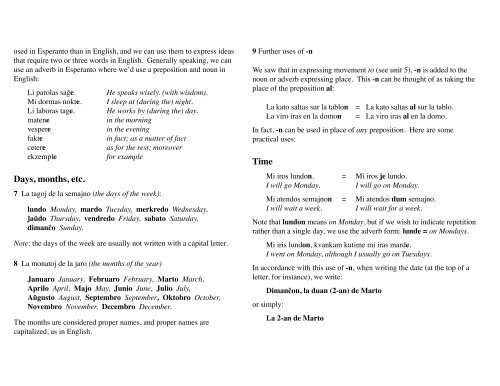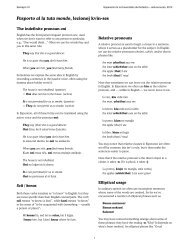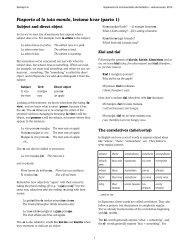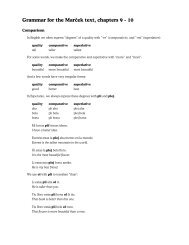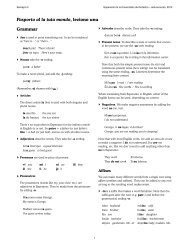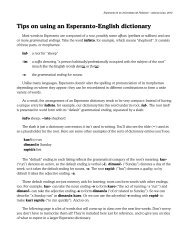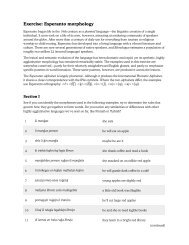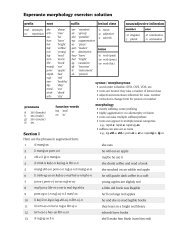The alphabet and pronunciation - Lodestone
The alphabet and pronunciation - Lodestone
The alphabet and pronunciation - Lodestone
- No tags were found...
Create successful ePaper yourself
Turn your PDF publications into a flip-book with our unique Google optimized e-Paper software.
used in Esperanto than in English, <strong>and</strong> we can use them to express ideasthat require two or three words in English. Generally speaking, we canuse an adverb in Esperanto where we’d use a preposition <strong>and</strong> noun inEnglish:! Li parolas sa"e.! He speaks wisely. (with wisdom).! Mi dormas nokte.! I sleep at (during the) night.! Li laboras tage.! He works by (during the) day.! matene! in the morning! vespere! in the evening! fakte! in fact; as a matter of fact! cetere! as for the rest; moreover! ekzemple! for exampleDays, months, etc.7 La tagoj de la semajno (the days of the week):! lundo Monday, mardo Tuesday, merkredo Wednesday,! !a"do Thursday, vendredo Friday, sabato Saturday,! diman#o Sunday.Note: the days of the week are usually not written with a capital letter.8 La monatoj de la jaro (the months of the year)! Januaro January, Februaro February, Marto March,! Aprilo April, Majo May, Junio June, Julio July,! A"gusto August, Septembro September, Oktobro October,! Novembro November, Decembro December.<strong>The</strong> months are considered proper names, <strong>and</strong> proper names arecapitalized, as in English.9 Further uses of -nWe saw that in expressing movement to (see unit 5), -n is added to thenoun or adverb expressing place. This -n can be thought of as taking theplace of the preposition al:! La kato saltas sur la tablon! =! La kato saltas al sur la tablo.! La viro iras en la domon! =! La viro iras al en la domo.In fact, -n can be used in place of any preposition. Here are somepractical uses:Time! Mi iros lundon.! =! Mi iros je lundo.! I will go Monday.! ! I will go on Monday.! Mi atendos semajnon! =! Mi atendos dum semajno.! I will wait a week.! ! I will wait for a week.Note that lundon means on Monday, but if we wish to indicate repetitionrather than a single day, we use the adverb form: lunde = on Mondays.! Mi iris lundon, kvankam kutime mi iras marde.! I went on Monday, although I usually go on Tuesdays.In accordance with this use of -n, when writing the date (at the top of aletter, for instance), we write:! Diman#on, la duan (2-an) de Martoor simply:! La 2-an de Marto


